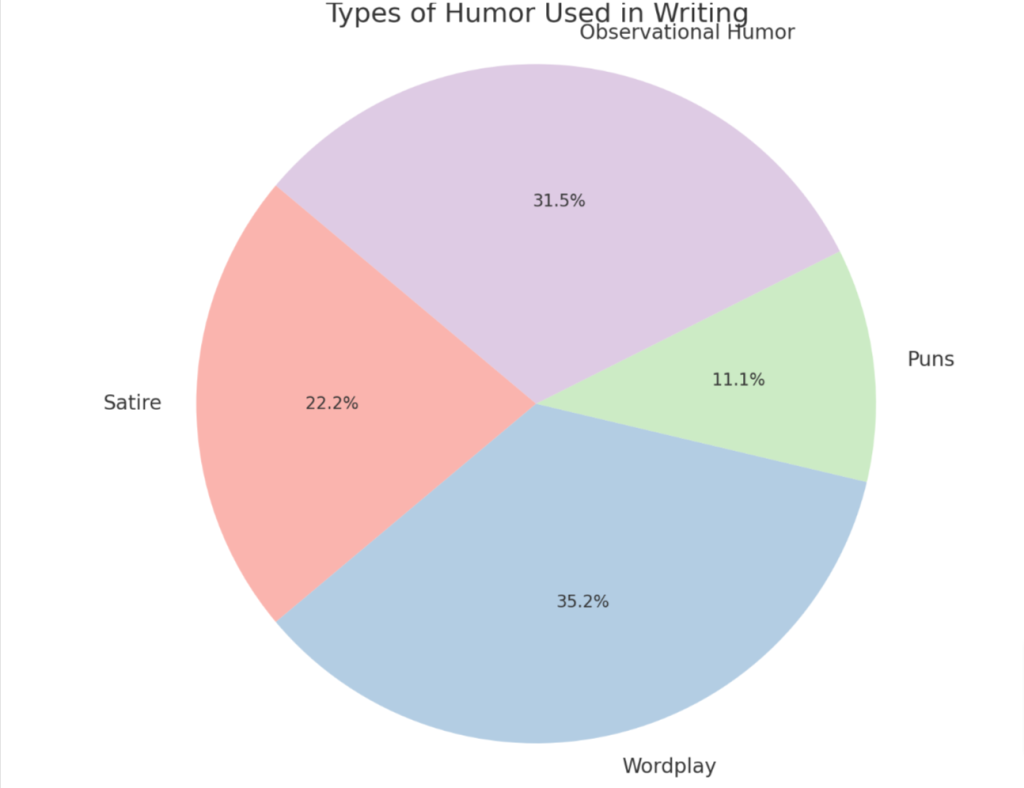Crafting Laughter: The Art of Humorous Writing
If your written work tends to be as dry as a desert, you’re not alone. Many writers struggle to incorporate humor effectively into their work. This article will serve up some handy tips for adding that much-needed zing and laughter to your prose.
Ready for a dash of fun?.
Key Takeaways
- Humor enhances reader engagement by making written work more enjoyable and memorable.
- Injecting humor into writing adds depth and relatability, creating multi – layered stories that resonate with readers.
- Humor can make difficult topics more approachable by lightening the tone and reducing tension.
- To incorporate humor effectively, understand your genre and audience, study comedians or humorous works, draw inspiration from real-life experiences, and use literary devices such as metaphors, similes, wordplay, and satire.
- Common mistakes to avoid when using humor in writing include trying too hard to be funny, going too far with inappropriate jokes or making light of serious topics,and plagiarism.
What is Humor and Why is it Important in Writing?
Humor enhances reader engagement, adds depth and relatability to writing, and can make difficult topics more approachable.
Enhances reader engagement
Humor serves as a powerful tool for capturing readers’ attention. It keeps them glued to the pages, eager to see what comes next. By tickling their funny bones, you make your written piece more enjoyable and memorable.
Funny anecdotes or clever wordplay can enliven even the most mundane subjects. This engaging style of writing encourages readers to stick with your work longer than they might otherwise do.
Ultimately, humor plays an essential part in enhancing reader engagement through its unique charm and wit that spurs interest and curiosity among audiences.
Adds depth and relatability to writing
Injecting humor into your content achieves depth and complexity. It brings narratives to life, creating multi-layered stories that resonate with readers on various levels. Through wit and amusement, you can mold intricate characters or situations in an entertaining manner.
Humorous writing promotes a deeper connection between the reader and the text as it mirrors real-life encounters.
Humor contributes significant relatability to your prose. By tapping into common experiences or shared amusements, it scaffolds a bridge of familiarity towards your audience. Everyone has had moments of laughter; utilizing this universal factor effectively blurs the line between writer and reader fostering engagement through comic relief.
Can make difficult topics more approachable
Injecting humor into your writing effectively breaks down barriers, making difficult topics more accessible. Stern subject matters often intimidate readers, but the clever use of humor can lighten the tone and sustain reader interest.
Humor reduces tension and provides a gentle landing for heavy issues. It allows writers to address ticklish subjects without losing their audience’s engagement. This strategy is widely used in crafting thought-provoking articles, creating captivating prose that leaves a lasting impact on readers’ minds.
The key lies in striking a balance between amusement and respect towards sensitive themes while using comedy writing techniques aptly tailored to fit your content contextually.
How to Incorporate Humor into Your Writing Effectively
To incorporate humor into your writing effectively, it is important to know your genre and audience. Study comedians or humorous works to understand different techniques. Draw inspiration from real-life experiences and use literary devices such as puns or wordplay to add humor to your prose.
Know your genre and audience
Knowing your genre and audience is crucial when incorporating humor into your writing. Understanding the type of content you are creating and who will be reading it helps you tailor your humor to their preferences.
Different genres have different expectations for humor, so being aware of these conventions allows you to use appropriate comedic techniques. Additionally, knowing your audience’s interests, values, and sense of humor enables you to create jokes or funny anecdotes that resonate with them specifically.
By understanding your genre and audience, you can effectively incorporate humor in a way that captivates readers and keeps them engaged throughout your writing.
Study comedians or humorous works
To effectively incorporate humor into your writing, it can be helpful to study comedians or humorous works. This allows you to learn from their techniques and understand what makes people laugh. Here are some ways you can do this:
- Watch stand – up comedy shows or listen to comedic podcasts to observe different styles of humor.
- Read humorous books, articles, or blogs to gain inspiration and see how authors use wit and comedic elements in their writing.
- Analyze jokes and funny anecdotes to understand the structure and timing that make them amusing.
- Pay attention to comedic storytelling techniques, such as using unexpected twists or exaggeration for comedic effect.
- Take note of how comedians use wordplay, puns, and clever one – liners to add humor to their performances.
Draw inspiration from real-life experiences
Tap into the humor that exists in everyday life. Find amusing anecdotes, funny moments, or quirky observations from your own experiences. Your real-life stories and interactions can serve as a rich source of inspiration for injecting humor into your writing.
By drawing on relatable situations and personal experiences, you can add an authentic and captivating touch to your work that will resonate with readers. Use these moments to craft comedic elements that are engaging, entertaining, and sure to make them laugh.
Use literary devices
Literary devices can add depth and wit to your writing, making it more captivating for readers. Incorporating these techniques can help you effectively infuse humor into your prose. Here are some literary devices that you can use:
- Metaphors: Create funny comparisons by using metaphors to describe people or situations.
- Similes: Make humorous comparisons using similes that highlight the absurdity or unexpectedness of a situation.
- Hyperbole: Exaggerate for comedic effect by using hyperbole to emphasize a point or create a humorous image.
- Irony: Play with irony to create humor by saying one thing but meaning the opposite.
- Wordplay: Utilize puns, double entendre, or homophones to add clever wordplay that elicits laughter.
- Satire: Employ satire to mock or ridicule societal conventions, behaviors, or individuals in a humorous way.
- Repetition: Repeat certain words, phrases, or ideas in a comedic manner to enhance the humor.
Common Mistakes to Avoid When Using Humor in Writing
When using humor in writing, there are several common mistakes to avoid. Trying too hard to be funny can come across as forced and unnatural. It’s important to strike a balance between comedic elements and the overall message of your piece.
Additionally, going too far with inappropriate or offensive jokes can alienate readers and damage your credibility. Using humor to make light of serious topics is another pitfall to avoid, as it can undermine the importance and gravity of certain subjects.
Lastly, plagiarism should never be used as a source for humor; originality is key when incorporating comedy into your writing.
Trying too hard
Trying too hard to be funny in your writing can often backfire. While humor adds depth and relatability to your work, forcing jokes or trying too hard to make readers laugh can come across as unnatural and forced.
It’s important to strike a balance between being humorous and maintaining the overall tone of your piece.
When incorporating humor into your writing, it’s essential to remember that not every sentence needs to be a punchline. Trying too hard may lead to jokes that fall flat or seem out of place.
Going too far
Some writers may push the boundaries of humor, going too far in their attempts to make readers laugh. This can result in offensive or insensitive content that alienates readers instead of engaging them.
It’s important to strike a balance and consider the impact your humor may have on different audiences. Always be mindful of whether your jokes are appropriate for the subject matter and ensure that you’re not crossing any offensive lines.
Using humor to make light of serious topics
Using humor to address serious topics can be a powerful tool in writing. It allows you to engage your readers and make difficult subjects more approachable. By incorporating comedic elements, you add a lightheartedness that can captivate your audience and keep them entertained.
However, it’s important to strike the right balance – avoid going too far or making light of sensitive issues. Humor should enhance your message without undermining its significance.
Foster a connection with your readers by using wit and irony to bring levity to serious discussions in an effective and impactful way.
Plagiarism
Plagiarism is a serious issue that writers should always be mindful of when incorporating humor into their work. It involves using someone else’s ideas, words, or creative content without giving proper credit.
Plagiarism not only violates ethical standards but can also lead to legal consequences and damage your reputation as a writer. To avoid plagiarism, always make sure to properly attribute any sources you reference and give credit where it is due.
By doing so, you can continue to write funny and engaging content while maintaining the integrity of your work.
Examples of Humor in Literature
Jane Austen, Oscar Wilde, and Terry Pratchett are just a few authors who have mastered the art of incorporating humor into their writing. From witty dialogue to clever satire, these literary geniuses will leave you in stitches.
Read on to discover how they use humor to entertain and engage readers!

Jane Austen
Jane Austen is a renowned author who skillfully incorporated humor in her writings. Her novels, such as “Pride and Prejudice” and “Sense and Sensibility,” are known for their witty dialogue and comedic situations.
Through clever wordplay, ironic observations, and humorous character interactions, Austen’s writing not only entertains readers but also provides insightful social commentary. Her ability to infuse humor into her prose makes her stories captivating and enjoyable to read.
Oscar Wilde
Oscar Wilde is a renowned writer known for his razor-sharp wit and clever humor. His plays and novels are filled with witty dialogue, humorous observations, and satirical commentary on society.
Wilde’s use of irony and wordplay adds an entertaining element to his writing while also highlighting deeper social issues. With his comedic talent, he captivates readers by making them laugh while delivering thought-provoking messages through his prose.
Whether it’s through the absurdity of situations or the clever banter between characters, Oscar Wilde’s work serves as an excellent example of how humor can be effectively incorporated into writing.
Terry Pratchett
Terry Pratchett, a beloved British author, was known for his wit and humor in his writing. He had a unique ability to infuse comedic elements into his stories, captivating readers with his clever wordplay and satirical take on various subjects.
Pratchett’s humorous writing style allowed him to tackle serious topics in a lighthearted manner, making readers chuckle while also conveying deeper messages. His imaginative and entertaining prose continues to entertain audiences around the world, showing how effective humor can be in engaging readers and adding an extra layer of enjoyment to storytelling.
Conclusion
Incorporating humor into your writing can greatly enhance reader engagement and make your content more relatable. By knowing your audience and studying comedians or humorous works, you can effectively incorporate comedic elements into your writing.
Avoid common mistakes such as trying too hard or using humor inappropriately, and instead use literary devices to add depth and amusement to your prose. With practice and the right techniques, you’ll be able to make readers laugh and keep them entertained throughout your writing.

